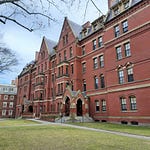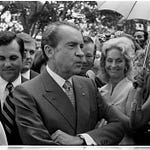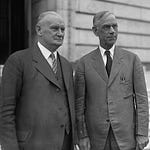
Even if we call something by a different name, that doesn’t make it true. The bedrock of America is liberty. We’re all liberals!
Abraham Lincoln liked to tell a profound truth with a simple analogy. The analogy is recounted in REMINISCENCES OF ABRAHAM LINCOLN, copyright 1885, pg 242.
In the story, someone asks a boy how many legs his calf would have if he called its tail a leg. The boy replies, “Five.”
The boy’s answer prompts a quick response that calling the tail a leg doesn’t make it a leg. The point, Lincoln highlighted, was that it’s still a tail, regardless of what it's called.
Calling something by a different name doesn’t change what it is.
And the reality of Americans is that even if you call us by different names, we’re all liberals.
“Liberal" and "liberty" share the same root word. It’s the Latin word "liber," which means "free." The shared etymology reflects the core value that underpins liberal thought.
Liberals believe in liberty. The bedrock of America is liberty. To expand on that thought:
Liberals believe in natural rights. We believe we inherently possess certain rights by virtue of being human. Governments don’t create these rights. In America, we believe in the right to life, liberty, and the pursuit of happiness.
Liberals believe the primary role of government is to safeguard these rights. A foundational idea in liberal thought is social contract theory. We prioritize individual freedoms and limit government power to protect our rights. We created a Bill of Rights and made other Constitutional Amendments to achieve this purpose.
Liberals believe we need to protect ourselves from tyranny. Liberal philosophy advocates for separating government powers as a safeguard against tyranny. We are a democratic republic instead of a pure democracy to protect ourselves from both the tyranny of the government and the tyranny of the majority. At the individual level, we believe in the right to protect ourselves.
Liberals believe in the rule of law. We emphasize laws apply equally to all and are made through a transparent, democratic process. We see the rule of law as essential to prevent arbitrary rule and protect individual rights. Without the rule of law as a critical institution, society would become a war of all against all. Keeping the peace requires laws and law enforcement.
Liberals believe in negative and positive rights. Liberals believe in negative rights — justified claims to be left alone. Freedom of speech is an example of a negative right. Liberals believe in positive rights — rights requiring someone to act to provide us with the right. Infrastructure and defense are examples of positive rights the government acts to provide. The concept of infrastructure is embedded in the idea of the social contract. We expect the government to use public resources to provide basic services essential for collective well-being and economic development.
Liberals share similar views regarding economic principles. Economic freedom is a critical component of the liberal tradition. We believe in free markets, the right to private property, and limited government intervention in personal financial affairs.
Liberals believe in cultural and social liberty. These rights include the freedom of speech, religion, and association. This is a belief fundamental to a liberal society. We believe individuals have the right to make personal choices that affect their lives and well-being. Henry David Thoreau described this as the right to "march to the beat of a different drummer.”
Do we all agree with every philosophical point of liberalism? No. Most of us don’t study and don’t even want to study the philosophy. Individuals may not align perfectly with every tenet of liberalism, but the foundational principles lay out American society.
Across parties, there is much room for common ground. The basic principles of liberty, equality, individual rights, and representative democracy are widely shared across our political spectrum. These principles form the bedrock of American political culture. We enshrined them in our founding documents, including the Declaration of Independence and the Constitution.
At their core, American conservatives and progressives alike share a commitment to liberal principles.
American conservatives are liberals. They emphasize limited government, individual freedom, and a free-market economy. These principles are classical liberal philosophy. Conservatives advocate for preserving individual liberties and rights, upholding the rule of law, and maintaining a system of government that restricts the state's power over the individual—all fundamental liberal ideals.
American progressives are liberals. They seek to expand rights and freedoms to include social and economic equality. This is a liberal principle. Progressivism also stems from liberal foundations, particularly the belief in democratic means to improve society and protect the rights of all citizens.
In sum, conservatives and progressives are liberals. Liberals believe in liberty. Both groups promote an America where individuals are free to pursue their own version of happiness, even if their approaches to achieving this vision differ.
Abraham Lincoln's analogy enlightens a fundamental truth: calling something by a different name doesn’t change what it is.
Call both groups what you will, but American conservatives and progressives alike are liberals. We believe in liberty.
Core liberal principles—a belief in natural rights, individual freedom, economic liberty, the rule of law, and protection from tyranny—unite us.
We have competing views on how to best achieve our vision. At the same time, our shared foundation will bridge our divides.
May God bless the United States of America.
Postscript AI generated from the audio version:
I was on BlueSky this week, which is a social media capability similar to Twitter.
I saw a thread that an American individual and some Europeans were commenting on how America's democracy is flawed.
The American posited that the Constitution is part of the problem for American democracy.
I totally agree with his take that our Constitution outlines that we aren't a pure democracy.
Because we're not a pure democracy.
The foundation of America is not democracy.
The foundation of America is individual liberty.
Our Constitution wasn't a mistake.
It didn't outline that we're not a pure democracy because the founders messed it up.
James Madison even wrote Federalist Paper No. 10, outlining how representative democracy with divided power protects individuals from the tyranny of government and from the tyranny of the majority.
A pure democracy doesn't protect individuals from the tyranny of the majority.
That's why we're not a pure democracy.
And I didn't want to write an entire article about it because people think I'm crazy that I write an article about how America is not a democracy.
America is a democratic republic.
We're not a pure democracy.
It's not an accident.
So, to the gentleman on BlueSky, I just wanted to leave a note.
We didn't mess it up.
We're not a pure democracy.
We are a constitutional democratic republic that protects liberty over democracy.














Share this post